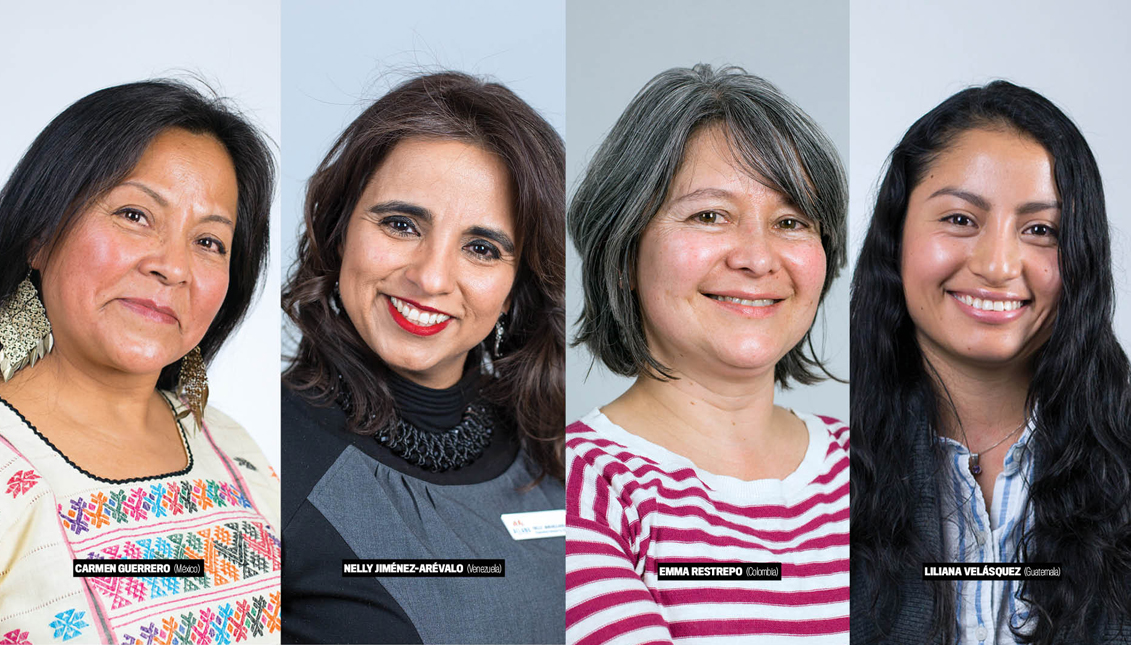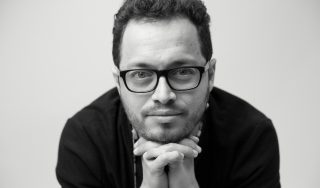
Immigrant Voices
AL DÍA News joins the celebration of Immigrant Heritage Month by highlighting the contributions of twelve Latino immigrants that, by their presence alone,…
Over 325 million people live in the United States. Although there is one foreign-born person per every eight people who live in the U.S., the vast majority of all Americans are descendants of immigrants.
Saying this should be redundant in a country that considers itself to be “the world’s melting pot,” but that phrase in and of itself is precisely the reason why we need to say it and acknowledge, over and over again, that this country is not just one nation, it’s thousands.
Here, one year is not enough time to celebrate the different heritages and cultures alive in our society: African American Heritage Month, American Indian Heritage Month, the Asian one, the Hispanic, the American… we are all heirs of cultures and traditions from across the globe.
With that premise in mind, a group of Dreamers created a campaign four years ago with one simple message: “Welcome to the U.S.” Since then, the country added one more heritage celebration to the calendar: that of the foreigner.
There is no better time than Immigrant Heritage Month to take a look at the numbers and put into perspective the experience of millions of people that contribute to this country, at times anonymously, often without recompense and recognition, receiving only the scorn and prejudice of other Americans in return.
According to the most recent American Community Survey, there are 43.7 million immigrants living in the U.S., amounting to a community as large as the entire population of Colombia.
If we add the 16.6 million U.S.-born children of immigrants to the total, the immigrant community skyrockets to 60.4 million people.
Of those 43.7 million foreigners, we have 11.3 million undocumented immigrants. Out of them, we have 3.6 million potential Dreamers, 1.8 million of whom meet the criteria to apply for DACA protection, though only 800,000 have applied and been accepted as DACA recipients.
In a time in which xenophobic rhetoric has tried to erase immigrants from the map, it is also important for all Americans to be aware of the economic weight of immigrants, which is many times the value of Donald Trump’s gleaming tower on 5th Avenue in New York City.
A recent report by the Fiscal Policy Institute concluded that immigrants are 16 percent of the U.S. labor force and 18 percent of businesses owners.
“This differential of two percentage points means immigrants are about 10 to 15 percent more likely to be business owners than their U.S.-born counterparts,” says the FPI study “Bringing Vitality to Main Street: How Immigrants Small Businesses Help Local Economies Grow”.
Along the same lines, research on immigration and entrepreneurship conducted in 2016 by the Kauffman Foundation concluded that immigrants create a quarter of new businesses in the U.S.; a trend that jumped from 13.3 percent in 1996 to 28.5 percent in 2014.
But the importance of immigrants cannot be measured solely by how many businesses they open or what jobs they create or the revenue they produce. Leaving aside their immigration status or their buying power of $14 billion, the tax contributions of immigrants is enormous: 6 billion dollars in 2014, according to a report from the New American Economy, an organization consisting of over 500 local mayor and entrepreneurs.
The local numbers are similar. According to the Census Bureau, 13 percent of Philly’s population are immigrants (205,000). The Pew Research Center estimates that among them 50,000 to 60,000 are undocumented.
This makes Philadelphia’s immigrant community the second largest among the five biggest cities on the Northeast coast: New York City (525,000), Boston (35,000), Washington (25,000), and Baltimore (15,000).
The New American Economy study demonstrates that immigrants in Philadelphia are 43.1 percent more likely to open their own business and that over 40,000 foreign entrepreneurs have played a major role in reversing the city’s population decline over the past 50 years, developing its economy and revitalizing its neighborhoods.
In the City of Brotherly Love, there are countless immigrant stories like those of Carmen Guerrero, Emma Restrepo, Nelly Jiménez-Arévalo and Liliana Velásquez; all of them Latino immigrants who have contributed to these changes, and can speak to the realities these numbers and studies show.
From her organization Coalición Fortaleza Latina, Carmen has woven a solidary net among Americans and Latinos in Norristown.
Emma hosts “Para ti, Mujer,” the first and only Latino radio show focused on issues from a gender perspective that matter to a Latino community that still needs to rid itself of “machismo” components and strive for greater gender equality.
From ACLAMO Family Centers, Nelly directs efforts to empower the Latino community in Montgomery County.
Liliana is the youngest of this group, but not any less powerful for her youth. At the age of 14, she left her village in Guatemala, traveled alone 2,200 miles, and survived experiences no child should have to experience to reach the United States to begin a life and future here.
At the age of 19, she has already published a book, which has helped her to heal her wounds and share her experience with kids in several of Philly’s schools who are reading her account of her immigration journey.
These four stories, and eight more, are published in the I am an American Immigrant section at aldianews.com as part of a campaign created to join the celebration of Immigrant Heritage Month in Philadelphia and highlight the journeys and stories of some of the immigrants who enrich the city in a myriad of ways every day of the year.
David Hurtado (Bolivia)
To him, the experience of being an immigrant is ambiguous and can allow us to take the best from each culture.
“Usually as an immigrant when you first arrive, you’re surprised by the new things, and a lot of time you feel like the old times were better. And sometimes when you have the chance to go back, you begin to miss your new society.”
Hurtado adds that acknowledging our contributions “is vital because a lot of time we feel like we just arrived. All of us at one time or another have been told ‘Why don’t you go back to your country?’, especially when we are speaking Spanish. It’s important to showcase that because there are people who look like you, who sound like us, who have been making this country a better place from the beginning.”
Cristina Martínez (México)
Cristina became famous after Bon Appetit ranked her restaurant South Philly Barbacoa among the 10 best restaurants in the United States. Since then, the cook has taken advantage of her fame to promote the rights of undocumented workers in the food industry.
She says immigrants’ contributions are real. “In the restaurant industry, we pay our taxes, we contribute with everything we buy in this country. We also bring people from other cities to try our food, so they come to visit us, so they can enjoy what is in Philadelphia.
“In years past, Philadelphia was dead. Currently, food has had a very large effect. We have people visiting us from other places, from other countries because there are a variety of restaurants from all over the world. And there is an immigrant [working] in every kitchen of every restaurant.”
Édgar Ramírez (México)
Édgar is the unofficial historian, the chronicler who has yet to write his first chronicle, the know-it-all guy who can tell you all of the most interesting facts about the Mexican community in South Philadelphia.
The founder of Philatinos Radio says “Mexicans’ contribution is that, as newcomers, we want to work a lot. We contribute in basically every aspect: economy, workforce, entrepreneurship. Sometimes, U.S. society thinks that we make a lot of money and that we send it all to Mexico. But let’s be realistic: we pay rent, we eat, we dress, we use public transportation… Our money also stays here, as well as our lives, our efforts, our contributions, our knowledge, our education… We give everything of ourselves without thinking too much.”
Brujo de la Mancha (México)
Francisco Javier Hernández Carvajal (Brujo’s real name) says that the contributions of Mexican immigrants can be seen anywhere in the city.
“When I came to Philadelphia in 1998, the whole city looked like an after-war zone, abandoned houses falling apart. And it took a few years for me to start seeing more Mexicans in Philadelphia, and at the same time start seeing these houses [getting] fixed.
RELATED CONTENT
So, what are the contributions of all these people from South, Central America and Mexico? Their hands, their labor. Philadelphia would be the same as 20 years ago if it were not for the Mexicans who, for seven or eight dollars an hour, rebuilt many houses. We have all theses businesses in South Philadelphia, that somewhere somehow is not an Italian Market anymore. It has that name, but it looks like La Merced, a huge market in Mexico City.”
Emilio Buitrago (Venezuela)
Emilio arrived in the United States in 1996 directly from Caracas. He came with the intention of perfecting his English to work better with his American colleagues at CANTV, the Venezuelan telecommunications company that had been privatized years ago.
The opportunities were presented and today he completes 22 years living the American Dream.
To Emilio, “Philadelphia is a ‘sanctuary city,’ immigrants are welcomed to the city. Philadelphia has a great immigrant community, not only Latinos, but Asians, Europeans…
“The buying power of Latino immigrants is 1.3 trillion dollars and there is about 12 or 13 trillion in GDP (Gross Domestic Product), and that’s the power that we bring to the table.”
Sheila Quintana (México)
To the daughter of Mexican immigrants, the human rights defender, the anthropologist educated at the UPenn and the queer woman, “immigrant communities do so much with little or no recognition. We are an incredibly important part of the labor force and at the same time are denied every single right that a worker deserves; by and large immigrant workers are the most precarious workers. We also contribute culturally, artistically... Our presence as human beings is a contribution.
We should honor ourselves, our humanity, our contributions - however you decide to define them, whether you decide to claim your rights as a worker, your rights as a small business owner, or as an artist... We deserve to honor those contributions by fighting for our dignity.”
Pedro Rodríguez (Dominican R.)
Rodríguez runs an office responsible for 30,000 employees, many of them the sons and daughters to immigrant families.
He thinks the contribution of immigrants lies in their ability to work.
“We can provide leadership on a number of other fronts to bring the city together, to provide a different point of view on the burning problems that we have: the question of medication, the question of affordable housing, the question of having access to quality services, the question of being politically represented in the bodies that make policy in the city and in the state.
Immigrants in Philadelphia are beginning to shape the revitalization of neighborhoods that have decayed over decades of regret and abandoned.”
Manuel Portillo (Guatemala)
Manuel is a survivor of the war in Guatemala. He arrived in the U.S. in the mid-1980s and since then he hasn’t stopped empowering communities here.
“We offer a lot of leadership to the city. We are also people that don’t fool around, we are here with a purpose. We are hard workers, we focus on our goals, we are family-oriented and having a job and a useful social role is very important for us.
“A lot of times, success stories are viewed more in terms of the person who claims she or he went up the ladder and became a millionaire. I [define] success in listening to people and understanding that every person has his right to define his or her own success.”










LEAVE A COMMENT: